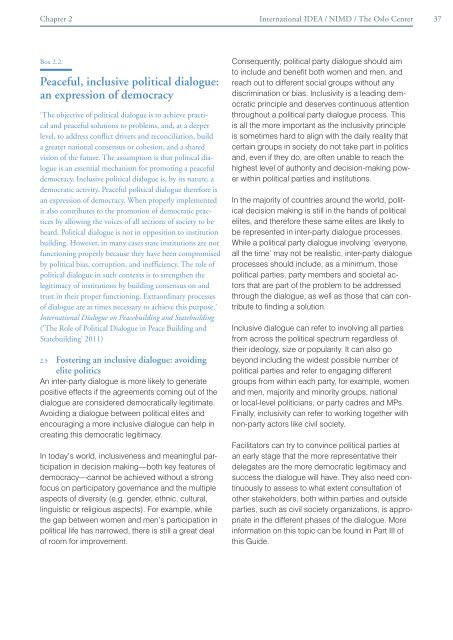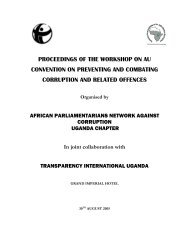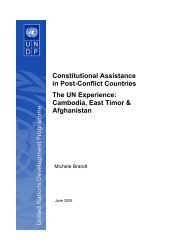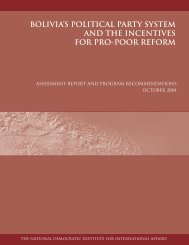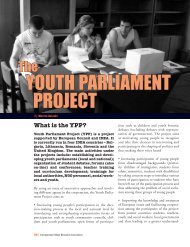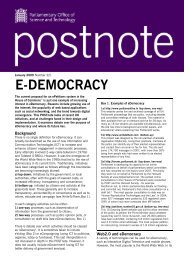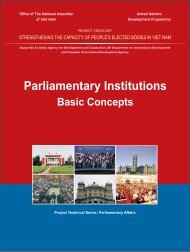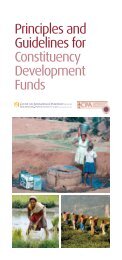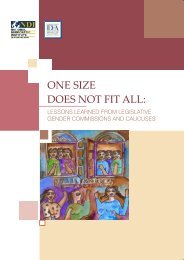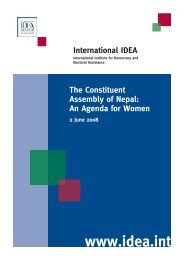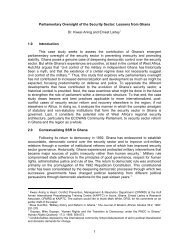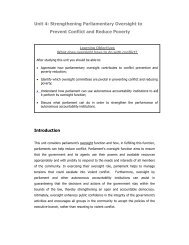Political Party Dialogue â A facilitators guide
Political Party Dialogue â A facilitators guide
Political Party Dialogue â A facilitators guide
Create successful ePaper yourself
Turn your PDF publications into a flip-book with our unique Google optimized e-Paper software.
Chapter 2International IDEA / NIMD / The Oslo Center37Box 2.2.Peaceful, inclusive political dialogue:an expression of democracy‘The objective of political dialogue is to achieve practicaland peaceful solutions to problems, and, at a deeperlevel, to address conflict drivers and reconciliation, builda greater national consensus or cohesion, and a sharedvision of the future. The assumption is that political dialogueis an essential mechanism for promoting a peacefuldemocracy. Inclusive political dialogue is, by its nature, ademocratic activity. Peaceful political dialogue therefore isan expression of democracy. When properly implementedit also contributes to the promotion of democratic practicesby allowing the voices of all sections of society to beheard. <strong>Political</strong> dialogue is not in opposition to institutionbuilding. However, in many cases state institutions are notfunctioning properly because they have been compromisedby political bias, corruption, and inefficiency. The role ofpolitical dialogue in such contexts is to strengthen thelegitimacy of institutions by building consensus on andtrust in their proper functioning. Extraordinary processesof dialogue are at times necessary to achieve this purpose.’International <strong>Dialogue</strong> on Peacebuilding and Statebuilding(‘The Role of <strong>Political</strong> <strong>Dialogue</strong> in Peace Building andStatebuilding’ 2011)2.5 Fostering an inclusive dialogue: avoidingelite politicsAn inter-party dialogue is more likely to generatepositive effects if the agreements coming out of thedialogue are considered democratically legitimate.Avoiding a dialogue between political elites andencouraging a more inclusive dialogue can help increating this democratic legitimacy.In today’s world, inclusiveness and meaningful participationin decision making—both key features ofdemocracy—cannot be achieved without a strongfocus on participatory governance and the multipleaspects of diversity (e.g. gender, ethnic, cultural,linguistic or religious aspects). For example, whilethe gap between women and men’s participation inpolitical life has narrowed, there is still a great dealof room for improvement.Consequently, political party dialogue should aimto include and benefit both women and men, andreach out to different social groups without anydiscrimination or bias. Inclusivity is a leading democraticprinciple and deserves continuous attentionthroughout a political party dialogue process. Thisis all the more important as the inclusivity principleis sometimes hard to align with the daily reality thatcertain groups in society do not take part in politicsand, even if they do, are often unable to reach thehighest level of authority and decision-making powerwithin political parties and institutions.In the majority of countries around the world, politicaldecision making is still in the hands of politicalelites, and therefore these same elites are likely tobe represented in inter-party dialogue processes.While a political party dialogue involving ‘everyone,all the time’ may not be realistic, inter-party dialogueprocesses should include, as a minimum, thosepolitical parties, party members and societal actorsthat are part of the problem to be addressedthrough the dialogue, as well as those that can contributeto finding a solution.Inclusive dialogue can refer to involving all partiesfrom across the political spectrum regardless oftheir ideology, size or popularity. It can also gobeyond including the widest possible number ofpolitical parties and refer to engaging differentgroups from within each party, for example, womenand men, majority and minority groups, nationalor local-level politicians, or party cadres and MPs.Finally, inclusivity can refer to working together withnon-party actors like civil society.Facilitators can try to convince political parties atan early stage that the more representative theirdelegates are the more democratic legitimacy andsuccess the dialogue will have. They also need continuouslyto assess to what extent consultation ofother stakeholders, both within parties and outsideparties, such as civil society organizations, is appropriatein the different phases of the dialogue. Moreinformation on this topic can be found in Part III ofthis Guide.


